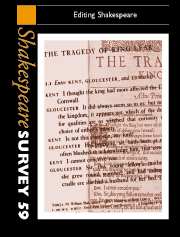Book contents
- Frontmatter
- Editing Shakespeare’s Plays in the Twentieth Century
- Crisis in Editing?
- On Being a General Editor
- Altering the Letter of Twelfth Night: ‘Some are born great’ and the Missing Signature
- ‘A Thousand Shylocks’: Orson Welles and The Merchant of Venice
- The Date and Authorship of Hand D’s Contribution to Sir Thomas More: Evidence from ‘Literature Online’
- Ferdinand’s Wife and Prospero’s Wise
- Editing Stefano’s Book
- Manuscript, Print and the Authentic Shakespeare: The Ireland Forgeries Again
- The Author, the Editor and the Translator: William Shakespeare, Alexander Chalmers and Sándor Petofi or the Nature of a Romantic Edition
- Women Edit Shakespeare
- The Shakespeare Edition in Industrial Capitalism
- Print and Electronic Editions Inspired by the New Variorum Hamlet Project
- The Evolution of Online Editing: Where Will it End?
- The Director as Shakespeare Editor
- The Editor as Translator
- Performance Editions, Editing and Editors
- Editing Collaborative Drama
- Will in the Universe: Shakespeare’s Sonnets, Plato’s Symposium, Alchemy and Renaissance Neoplatonism
- Giants and Enemies of God: The Relationship between Caliban and Prospero from the Perspective of Insular Literary Tradition
- Shakespeare’s Ages
- Who Wrote William Basse’s ‘Elegy on Shakespeare’?: Rediscovering a Poem Lost from the Donne Canon
- ‘Sometime a Paradox’: Shakespeare, Diderot and the Problem of Character
- Shakespeare Performances in England, 2005
- Professional Shakespeare Productions in the British Isles, January–December 2004
- The Year's Contributions to Shakespearian Study 1 Critical Studies
- 2 Shakespeare in Performance
- 3 Editions and Textual Studies
- Index
3 - Editions and Textual Studies
Published online by Cambridge University Press: 28 March 2007
- Frontmatter
- Editing Shakespeare’s Plays in the Twentieth Century
- Crisis in Editing?
- On Being a General Editor
- Altering the Letter of Twelfth Night: ‘Some are born great’ and the Missing Signature
- ‘A Thousand Shylocks’: Orson Welles and The Merchant of Venice
- The Date and Authorship of Hand D’s Contribution to Sir Thomas More: Evidence from ‘Literature Online’
- Ferdinand’s Wife and Prospero’s Wise
- Editing Stefano’s Book
- Manuscript, Print and the Authentic Shakespeare: The Ireland Forgeries Again
- The Author, the Editor and the Translator: William Shakespeare, Alexander Chalmers and Sándor Petofi or the Nature of a Romantic Edition
- Women Edit Shakespeare
- The Shakespeare Edition in Industrial Capitalism
- Print and Electronic Editions Inspired by the New Variorum Hamlet Project
- The Evolution of Online Editing: Where Will it End?
- The Director as Shakespeare Editor
- The Editor as Translator
- Performance Editions, Editing and Editors
- Editing Collaborative Drama
- Will in the Universe: Shakespeare’s Sonnets, Plato’s Symposium, Alchemy and Renaissance Neoplatonism
- Giants and Enemies of God: The Relationship between Caliban and Prospero from the Perspective of Insular Literary Tradition
- Shakespeare’s Ages
- Who Wrote William Basse’s ‘Elegy on Shakespeare’?: Rediscovering a Poem Lost from the Donne Canon
- ‘Sometime a Paradox’: Shakespeare, Diderot and the Problem of Character
- Shakespeare Performances in England, 2005
- Professional Shakespeare Productions in the British Isles, January–December 2004
- The Year's Contributions to Shakespearian Study 1 Critical Studies
- 2 Shakespeare in Performance
- 3 Editions and Textual Studies
- Index
Summary
EDITIONS
Nearly two decades ago, Gary Taylor concluded the revolutionary Oxford Shakespeare on a note of philosophic calm: ‘with our own task now behind us’, he wrote, speaking for himself and his colleagues, ‘we look forward to our future obsolescence’. The publication this year of a second edition, however, suggests that the editors are not yet ready to go gentle into that good night.
The Oxford Shakespeare Complete Works (1986) was an undisputed landmark in Shakespearian editing. It may rank as the best-selling edition in history, having sold somewhere in the neighbourhood of 600,000 copies to date, and it was certainly the most influential edition of the twentieth century. Although some of the Oxford innovations never got much traction – no subsequent edition of Henry IV has featured ‘Sir John Oldcastle’, nor have the alternative titles The First Part of the Contention or Richard Duke of York been embraced by any later edition of King Henry VI Parts 2 and 3 (not even those in the Oxford single-play series) – the decision to include both Quarto and Folio Lear was of major significance, inspiring numerous two-text editions of that play and launching discussions of version-based editing that have reshaped every branch of editorial theory and practice.
But if the Oxford Shakespeare was once a youthful iconoclast, it has now become a middle-aged member of the establishment. Whereas the rhetorical insistence upon groundbreaking uniqueness may have been appropriate in the first edition, that same rhetoric now seems out of place. A new ‘User’s Guide’ to the second edition claims that ‘because this edition represents a radical rethinking of the text, it departs from tradition more than most’ and lists among its ‘most radical departures’ the abandonment of ‘the tradition of conflation’. It goes on to assert that ‘most drastically, we present separately edited texts of both authoritative early editions of King Lear’.
- Type
- Chapter
- Information
- Shakespeare Survey , pp. 375 - 383Publisher: Cambridge University PressPrint publication year: 2006

